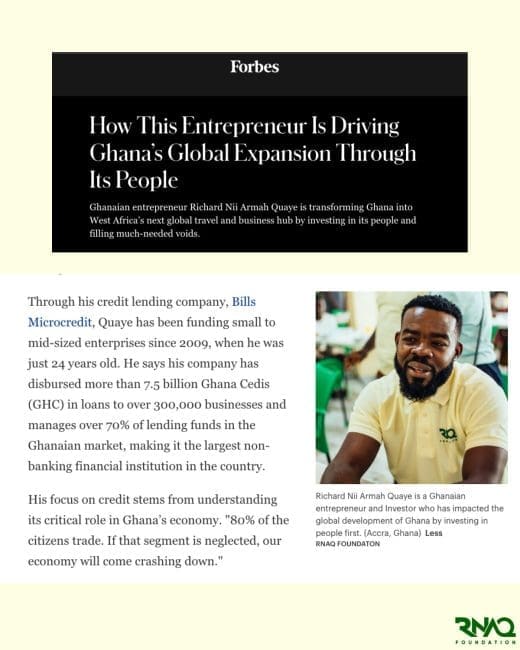Forbes contributor Martie Bowser has featured Ghanaian entrepreneur Richard Nii Armah Quaye in a comprehensive profile examining his transformative approach to business development through strategic human capital investment.
The September 24, 2025 Forbes article highlights how RNAQ, founder of RNAQ Holdings, is positioning Ghana as West Africa’s premier business and cultural hub by addressing critical market gaps through people-centered investments.
RNAQ’s flagship venture, Bills Microcredit, has reportedly disbursed over 7.5 billion Ghana Cedis (GHC) in loans to more than 300,000 businesses since 2009, when he launched the company at age 24. The microfinance institution now manages approximately 70% of lending funds in Ghana’s non-banking financial sector.
His investment philosophy stems from recognizing Ghana’s economic foundation. “80% of the citizens trade. If that segment is neglected, our economy will come crashing down,” RNAQ explained to Forbes, emphasizing the critical role of small enterprises in national economic stability.
Building on microfinance success, RNAQ established Quick Angels Limited in 2019 as Ghana’s first institutionalized angel investment company. The firm addresses equity funding gaps for young entrepreneurs struggling to access commercial bank financing.
One notable Quick Angels portfolio company, Chickenman-Pizzaman, expanded from a 2018 startup to over 100 locations across Ghana following RNAQ’s 2021 investment. The fast food chain has become the country’s largest such brand, employing more than 2,000 young Ghanaians.
Another portfolio company, Sankofa Natural Spices, promotes indigenous agricultural products now available in multiple United States grocery stores, demonstrating how local enterprises can achieve international market penetration.
“When you invest in an individual in the business space, you are investing in the nation,” RNAQ told Forbes, outlining his core investment principle that connects individual success to national development.

His latest initiative, the RNAQ Food Banks, launched August 1, 2025, addresses food insecurity through free daily meal service across five Greater Accra locations. Since opening, the food banks have served over 17,000 Ghanaians.
For RNAQ, this initiative transcends traditional charity models. Drawing from personal experience with poverty, he frames the food banks as “infrastructure for dignity and stability” rather than temporary relief measures.
The entrepreneur’s approach contrasts sharply with typical wealth extraction patterns among successful African business leaders. Rather than relocating capital offshore, RNAQ consistently reinvests profits within Ghana’s domestic economy.
“Your success has to impact the life of so many people in your country. Until you successfully do that, then you are not truly successful,” he explained to Forbes, articulating a success philosophy that prioritizes collective advancement over individual accumulation.
This philosophy extends to his portfolio companies, which provide comprehensive employee benefits including housing, transportation, and healthcare services. Ridge Medical Center, another RNAQ Holdings venture, expands healthcare infrastructure while Tigon Creative Studios develops Ghana’s media production capabilities.
RNAQ’s business model addresses what he identifies as a persistent challenge in African entrepreneurship: the misconception that locally-built businesses cannot achieve continental or global scale under indigenous leadership.
“The locally built businesses aren’t doing so well… that is something that I want to disrupt and stand as a testimony that as Africans, as Ghanaians, we are capable of building businesses from scratch and grow them to become continental,” he told Forbes.
His investment strategy aligns with Ghana’s broader positioning as a preferred destination for African diaspora business development, particularly following initiatives like 2019’s “Year of the Return” campaign that attracted significant international attention.
The Forbes recognition comes as Greater Accra Metropolitan Area experiences rapid growth, with current population reaching approximately 4 million and projected annual increases of 2%. This demographic expansion creates substantial opportunities for entrepreneurs addressing urban development challenges.

As RNAQ transitions to board member and silent partner roles across his portfolio, his focus shifts toward replication and mentorship. His stated objective involves creating and developing entrepreneurs who can replicate his model throughout Ghana’s business ecosystem.
The Forbes feature positions Quaye’s approach as potentially influential for emerging market entrepreneurs globally, particularly as impact investing and sustainable business practices gain international prominence.
However, questions remain about the long-term scalability of such philanthropic business models, especially as enterprises mature and face increasing pressure for conventional profit maximization from institutional investors.
The international recognition reflects growing global acknowledgment of indigenous African business leadership and the continent’s capacity for homegrown innovation in addressing systemic development challenges through entrepreneurial solutions.
Source: newsghana.com.gh










